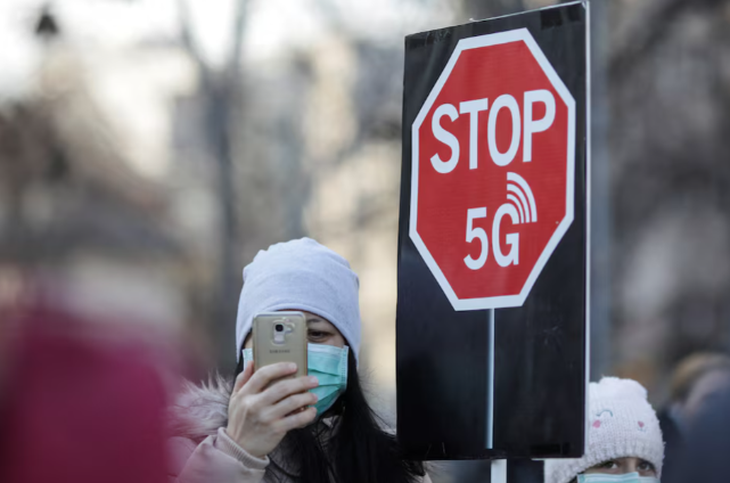
Whether 5G waves affect human health or not is still unclear. In the photo: A woman participates in a protest against 5G technology in Bucharest, Romania, January 25, 2020 - Photo: REUTERS
5G networks are becoming increasingly popular, with rapid coverage in major cities. This technology not only enhances the smartphone experience, but also paves the way for a series of smart connected devices in the IoT ecosystem.
What is 5G that makes the whole world both expect and worry?
5G is the fifth generation of mobile networks, designed to replace and surpass 4G with much faster transmission speeds, extremely low latency and the ability to connect millions of devices at the same time.
Thanks to higher frequency bands, especially mmWave frequencies, 5G can transmit data almost instantly , ushering in the era of self-driving cars, smart cities and virtual reality applications.
However, because it uses higher frequencies than previous generations of networks, 5G waves also raise concerns about the potential impact on human health.
Many people ask: can living among hundreds of small, continuously operating transmitters generate harmful radiation?
Controversy surrounding 5G waves
Since the 5G deployment began, a wave of controversy has erupted on many forums, social networks and even among experts. Many people are concerned that the high frequency of 5G waves can cause negative health effects such as headaches, insomnia, immune disorders, or more seriously, increased risk of cancer.
There was even a time when 5G waves were blamed for the COVID-19 pandemic, causing a series of broadcasting stations in some European countries to be vandalized.
Others worry that 5G could affect wildlife, disrupt the orientation of birds and bees, or create "electromagnetic pollution" in living spaces.
However, most of these concerns come from unverified information, widely spread online, without being based on clear scientific evidence.
Meanwhile, the international scientific community is continuing research to provide a more accurate and comprehensive answer.
Perspectives from international medical and research organizations
In the face of controversy, many medical and scientific organizations around the world have spoken out to clarify the link between 5G waves and human health. According to the World Health Organization (WHO), there is currently no convincing scientific evidence that exposure to radio waves from 5G transmission stations at permissible levels causes negative health effects.
The International Commission on Non-Ionizing Radiation Protection (ICNIRP), which sets safety guidelines for electromagnetic exposure, has also re-evaluated the data related to 5G. It concluded that 5G radiation, at current emission levels, is within safe limits and there is no basis to consider it a cause of cancer or biological damage.
It is worth noting that 5G waves use non-ionizing radiation, which is completely different from ionizing radiation such as X-rays or gamma rays. This type of wave does not have enough energy to break down DNA structure or cause cell mutations, which are necessary conditions for cancer to form.
However, many scientists agree that 5G is a new technology, deployed on a large scale not long ago, so it is still necessary to monitor the long-term effects over time. However, up to now, independent studies and assessments from major health agencies have not found any serious risks to human health.
Source: https://tuoitre.vn/song-5g-ket-noi-sieu-toc-lieu-co-anh-huong-suc-khoe-20250603000746773.htm



![[Photo] Prime Minister Pham Minh Chinh meets with South African President Matamela Cyril Ramaphosa](https://vphoto.vietnam.vn/thumb/1200x675/vietnam/resource/IMAGE/2025/10/23/1761226081024_dsc-9845-jpg.webp)
![[Photo] President Luong Cuong holds talks with South African President Matamela Cyril Ramaphosa](https://vphoto.vietnam.vn/thumb/1200x675/vietnam/resource/IMAGE/2025/10/23/1761221878741_ndo_br_1-8416-jpg.webp)
![[Photo] Prime Minister Pham Minh Chinh chairs meeting on railway projects](https://vphoto.vietnam.vn/thumb/1200x675/vietnam/resource/IMAGE/2025/10/23/1761206277171_dsc-9703-jpg.webp)



































































































Comment (0)